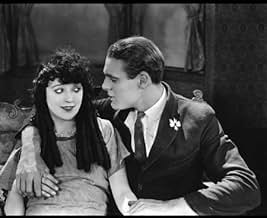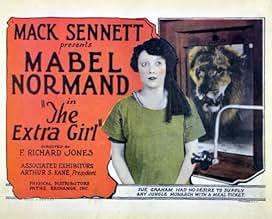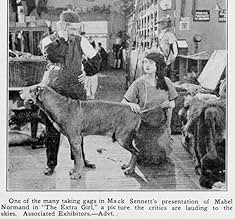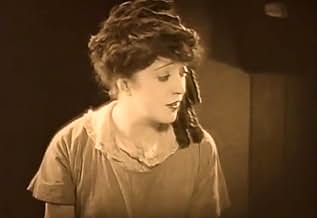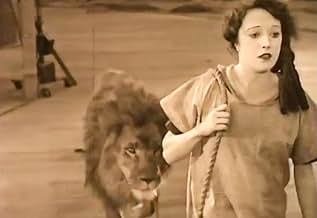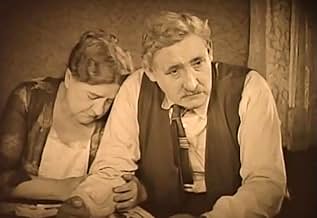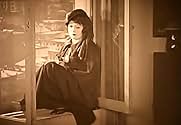IMDb RATING
6.7/10
1.2K
YOUR RATING
A small town girl dreams of movie stardom. A switched photo wins her a movie contract. However, when she arrives Hollywood, she is assigned to the props department. Her parents visit and inv... Read allA small town girl dreams of movie stardom. A switched photo wins her a movie contract. However, when she arrives Hollywood, she is assigned to the props department. Her parents visit and invest some money with a very shifty individual.A small town girl dreams of movie stardom. A switched photo wins her a movie contract. However, when she arrives Hollywood, she is assigned to the props department. Her parents visit and invest some money with a very shifty individual.
- Director
- Writers
- Stars
Anna Dodge
- Ma Graham
- (as Anna Hernandez)
George Beranger
- Actor in Wardrobe Line
- (as Andre Beranger)
Billy Armstrong
- Comedian in Derby
- (uncredited)
- Director
- Writers
- All cast & crew
- Production, box office & more at IMDbPro
Featured reviews
Cute, fast-paced romantic comedy starring Mabel Normand as a small town girl who wants to be an actress and has two local rivals for her affections - Aaron Applejohn (Vernon Dent), not exactly a heartthrob, but well-to-do (her dad's choice for a son-in-law, of course) and Dave (Ralph Graves), her handsome longtime sweetheart who she loves. Mabel decides to mail in her photo to a Hollywood movie contest, but the "Widow Brown" decides to help things along and hopefully get Mabel out of town (and get Dave for herself) by switching the photo in the envelope to one of a beautiful young woman (hmmm - I think Mabel is beautiful too, so why the switch?!). Anyway, in the meantime dad decides to MAKE her marry Applejohn (and is actually ready to take his belt to her!) when the telegram from Hollywood arrives saying she won the contest - just in the nick of time! When she arrives and the movie studio sees that she is not the same woman, she is put to work in the costume department. Soon her parents, and Dave too, are all in Hollywood with her - but nothing works out the way she expects.
Well, this film is well done and full of fun - Mabel is a charmer in this, as usual, I just love her expressive face! There is a lively, fast chase at one point, where Mabel is trying to get to the train station before she has to get married, with dad and Applejohn in hot pursuit - all well done on real rural (looked like suburban twenties L.A.) streets. I also enjoyed the scene where Mabel leads a lion through the studio, under the belief it is actually "Teddy the dog" in a lion suit - quite amusing. The DVD version of this I saw featured a very decent looking print and excellent piano score by composer Ben Model that really suited the film well. A very entertaining film.
Well, this film is well done and full of fun - Mabel is a charmer in this, as usual, I just love her expressive face! There is a lively, fast chase at one point, where Mabel is trying to get to the train station before she has to get married, with dad and Applejohn in hot pursuit - all well done on real rural (looked like suburban twenties L.A.) streets. I also enjoyed the scene where Mabel leads a lion through the studio, under the belief it is actually "Teddy the dog" in a lion suit - quite amusing. The DVD version of this I saw featured a very decent looking print and excellent piano score by composer Ben Model that really suited the film well. A very entertaining film.
An entertaining little comedy starring Mabel Normand, the beautiful funny girl who in her heyday was as famous as Chaplin but who is sadly mostly remembered today as a footnote to the spate of sex and drug scandals that afflicted Hollywood in the early twenties. At nearly thirty she does looks a bit old to be playing an ingénue, but she's nevertheless quite appealing as the scrappy but naïve farm girl Sue with her old fashioned ringlets and homemade dresses who is determined to take Hollywood by storm. She doesn't, and the movie rather than being a rags to riches chronicle you might have been expecting becomes a relatively prosaic account of the fate of thousands of girls who tried to make it in Hollywood, failed but ended up happy enough with ordinary lives as wives and mothers. The movie doesn't dwell too much on its more realistic elements, however, and viewers are most likely to remember those amusing set pieces as when Sue's overbearing father attempts to force her to get out of bed and dress for her wedding or (the highlight of the film) when Mabel, now working as a lackadaisical prop girl, mistakes a lion for a dog dressed up in a shoddy lion's costume and nonchalantly leads it about the set on a leash to the horror of onlookers.
"The Extra Girl" is good introduction to the work of a talented comedienne who deserves to be better know today.
"The Extra Girl" is good introduction to the work of a talented comedienne who deserves to be better know today.
Country girl Mabel Normand travels to Hollywood in the hope of becoming a movie star after winning a competition, without realising that her love rival for the boy-next-door, Ralph Graves, substituted a glamour photo for her own, so she ends up working in the costume department. Normand's health problems were finally beginning to take their toll when she made this pleasant but unremarkable comedy, and the William Desmond Taylor affair had irreparably damaged her career, but she still makes a winning heroine. Highlights include her disastrous audition and a lion on the loose in the studio.
Mabel plays Sue Graham, a small-town girl whose picture is mixed up with that of a much prettier girl that a movie studio decides they want to put under contract. When Sue arrives on the scene, the studio discovers its mistake and assigns Sue to the props department. Sue does overcome adversity, but not before she mistakes a dog dressed as a lion for an actual lion and her parents come out to Hollywood for a visit and end up exchanging their life's savings for some worthless oil stock. Note Vernon Dent, later of the Columbia comic shorts and specifically the Three Stooges series, as Sue's unwanted suitor.
"The Extra Girl" is one of the more charming silent films I have enjoyed recently, and it's too bad Mabel Normand is remembered more for the Hollywood scandals of the roaring 20's than her charming comic persona in silent films. Her frequent costar, Roscoe "Fatty" Arbuckle, suffered a much worse fate - the end of his career - over a crime of which he was acquitted. Like The Primitive Lover, I'm surprised more people haven't seen this film. Check it out, you won't regret it. The best existing DVD copies are in very good shape, and detail is clearly visible. There are only a few signs of deterioration towards the middle of the film.
"The Extra Girl" is one of the more charming silent films I have enjoyed recently, and it's too bad Mabel Normand is remembered more for the Hollywood scandals of the roaring 20's than her charming comic persona in silent films. Her frequent costar, Roscoe "Fatty" Arbuckle, suffered a much worse fate - the end of his career - over a crime of which he was acquitted. Like The Primitive Lover, I'm surprised more people haven't seen this film. Check it out, you won't regret it. The best existing DVD copies are in very good shape, and detail is clearly visible. There are only a few signs of deterioration towards the middle of the film.
This is not the usual Keystone comedy that we associate with Miss Normand. However, it should be understood that no 'Madcap Mabel' pictures had been produced since 1916, and the last of these contained little slapstick. The post-Goldwyn Sennett films are a build up to Extra Girl, which may be seen as the culmination of Mabel's art.
Extra Girl is a Cinderella story – sort of. The twist is that the heroine, Sue Graham, does not find happiness by marrying a prince, but an old friend. This plot is in total agreement with a then-current Hollywood maxim that no-one should come to tinsel town expecting to be put into movies, let alone become a star. Of course, Sue does go to Hollywood, but, for several reasons, finds life very tough indeed.
In the early scenes, Mabel is very pretty and passes tolerably well for the teenage small-town girl Sue with her banana curls. However, when she throws her arms around Ralph and exclaims 'My Sheik', the straining in her neck and face put more than a few years on her apparent age. By contrast, when she falls back into Ralph's arms, her face becomes relaxed and Mabel is instantly, and radiantly, beautiful. She is, fleetingly, the dying Cleopatra.
Mabel demonstrates a whole repertoire of facial expressions and eye movements while showing Ralph her acting ability. These are definitely worthy of the 'old Mabel'. Curiously, Mabel also uses certain facial expressions that are reminiscent of Stan Laurel. Now Stan didn't use these until after 1930, and after Mabel had collaborated with him at Hal Roach studios. I leave it to others to determine where the 'world's greatest mimic' got his famous face from. Elsewhere Mabel uses some of the classically cute Keystone Girl actions, like the poignant wave from the train, her head forward and one shoulder pulled up protectively (last seen in Mabel At The Wheel). Equally cute is the way she leans forward and points while delivering a firm message to the studio owner (also seen in Suzanna).
In this film, Mabel is fairly slim, but not overly so. Compared to the Mabel of, say, 'A Spanish Dilemma' (1912), Mabel does seem strangely flat chested, indicating, perhaps, that the common Sennett practice of chest strapping was used here. It is also clear that in some scenes, especially later in the film, Mabel looks quite ill and drained. Apparently, scenes requiring Mabel to look out of salts (e.g. when she was being married off and when her acting career was failing) were filmed on her worst days. The effects of the W.D. Taylor scandal cannot be underestimated in respect of these observations. It is odd to see Mabel in the film lying in wait for the swindler of her parents with a gun, considering the W.D. Taylor affair – a joke too far. The effect is doubled, as the Courtland Dines shooting occurred just after the film's completion, and another Dines affair weapon, a bottle, appears in the scene. Other aspects of the film that may reflect reality are the location of the Graham household at River Bend and the great swindle. Mabel had a good friend, Helen Holmes (of 'Hazards of Helen' fame), who originated in South Bend Indiana (like River Bend, between Pittsburgh and the Rocky Mountains). Helen's family were swindled of their money when they first moved to California.
Mabel ends up being a wardrobe girl, but persuades a director to give her a screen test. Due to various events the test turns out to be a hilarious farce. The wardrobe girl is wearing an old-fashioned crinoline hooped dress with the usual long pantalettes underneath. Unbeknown to her, as she bends over to pick some love letters up she exposes her white pantalettes, which have acquired the black imprint of a prop man's glove (she sat on the glove earlier). Everyone behind the camera begins to laugh, including Mack Sennett who has suddenly appeared in the scene. Was he there to ogle Mabel in her underwear, or was he there to laugh at the joke?
The best part of the film occurs later on when Mabel leads a lion around the studio thinking it is the Keystone dog, Teddy. It is hilarious to see the various actors running for their lives, while Mabel walks around totally oblivious to the danger. Mabel herself told a story about the director making her come close to the camera with the lion in tow, following which there was a sudden noise in the studio. This unnerved the lion who jumped and knocked Mabel flat, whereupon he bit into her posterior. However, it transpired that the 'bite' was the penetration of a pointed implement wielded by the director in order to drive the lion off – he'd missed! After the lion breaks away he chases Mabel around the studio in the old cranked-up way, with our heroine jumping and jerking in the old cranked-up way.
The Dines affair should have destroyed the box-office take of this film. However, Mack and Mabel (who had a 25% stake in the profits) made a supreme, nationwide effort to save it and were successful in their efforts. In court, nonetheless, Mabel ridiculed the prosecutors, and, as the newspapers were quick to relay, affected a pompous English accent and made continuous 'French' hand gestures. Mabel's career trickled away following the affair, and Mack canceled her next film 'Mary Anne'.
Extra Girl is a Cinderella story – sort of. The twist is that the heroine, Sue Graham, does not find happiness by marrying a prince, but an old friend. This plot is in total agreement with a then-current Hollywood maxim that no-one should come to tinsel town expecting to be put into movies, let alone become a star. Of course, Sue does go to Hollywood, but, for several reasons, finds life very tough indeed.
In the early scenes, Mabel is very pretty and passes tolerably well for the teenage small-town girl Sue with her banana curls. However, when she throws her arms around Ralph and exclaims 'My Sheik', the straining in her neck and face put more than a few years on her apparent age. By contrast, when she falls back into Ralph's arms, her face becomes relaxed and Mabel is instantly, and radiantly, beautiful. She is, fleetingly, the dying Cleopatra.
Mabel demonstrates a whole repertoire of facial expressions and eye movements while showing Ralph her acting ability. These are definitely worthy of the 'old Mabel'. Curiously, Mabel also uses certain facial expressions that are reminiscent of Stan Laurel. Now Stan didn't use these until after 1930, and after Mabel had collaborated with him at Hal Roach studios. I leave it to others to determine where the 'world's greatest mimic' got his famous face from. Elsewhere Mabel uses some of the classically cute Keystone Girl actions, like the poignant wave from the train, her head forward and one shoulder pulled up protectively (last seen in Mabel At The Wheel). Equally cute is the way she leans forward and points while delivering a firm message to the studio owner (also seen in Suzanna).
In this film, Mabel is fairly slim, but not overly so. Compared to the Mabel of, say, 'A Spanish Dilemma' (1912), Mabel does seem strangely flat chested, indicating, perhaps, that the common Sennett practice of chest strapping was used here. It is also clear that in some scenes, especially later in the film, Mabel looks quite ill and drained. Apparently, scenes requiring Mabel to look out of salts (e.g. when she was being married off and when her acting career was failing) were filmed on her worst days. The effects of the W.D. Taylor scandal cannot be underestimated in respect of these observations. It is odd to see Mabel in the film lying in wait for the swindler of her parents with a gun, considering the W.D. Taylor affair – a joke too far. The effect is doubled, as the Courtland Dines shooting occurred just after the film's completion, and another Dines affair weapon, a bottle, appears in the scene. Other aspects of the film that may reflect reality are the location of the Graham household at River Bend and the great swindle. Mabel had a good friend, Helen Holmes (of 'Hazards of Helen' fame), who originated in South Bend Indiana (like River Bend, between Pittsburgh and the Rocky Mountains). Helen's family were swindled of their money when they first moved to California.
Mabel ends up being a wardrobe girl, but persuades a director to give her a screen test. Due to various events the test turns out to be a hilarious farce. The wardrobe girl is wearing an old-fashioned crinoline hooped dress with the usual long pantalettes underneath. Unbeknown to her, as she bends over to pick some love letters up she exposes her white pantalettes, which have acquired the black imprint of a prop man's glove (she sat on the glove earlier). Everyone behind the camera begins to laugh, including Mack Sennett who has suddenly appeared in the scene. Was he there to ogle Mabel in her underwear, or was he there to laugh at the joke?
The best part of the film occurs later on when Mabel leads a lion around the studio thinking it is the Keystone dog, Teddy. It is hilarious to see the various actors running for their lives, while Mabel walks around totally oblivious to the danger. Mabel herself told a story about the director making her come close to the camera with the lion in tow, following which there was a sudden noise in the studio. This unnerved the lion who jumped and knocked Mabel flat, whereupon he bit into her posterior. However, it transpired that the 'bite' was the penetration of a pointed implement wielded by the director in order to drive the lion off – he'd missed! After the lion breaks away he chases Mabel around the studio in the old cranked-up way, with our heroine jumping and jerking in the old cranked-up way.
The Dines affair should have destroyed the box-office take of this film. However, Mack and Mabel (who had a 25% stake in the profits) made a supreme, nationwide effort to save it and were successful in their efforts. In court, nonetheless, Mabel ridiculed the prosecutors, and, as the newspapers were quick to relay, affected a pompous English accent and made continuous 'French' hand gestures. Mabel's career trickled away following the affair, and Mack canceled her next film 'Mary Anne'.
Did you know
- TriviaPenultimate feature film of Mabel Normand. She would not make another film for three years until her last feature Raggedy Rose (1926). Four shorts would follow in 1926-7 and she would pass away in 1930.
- Quotes
Dave Giddings: Sue wants to go into pictures. Do you think she has a chance?
- ConnectionsFeatured in The Great Chase (1962)
Details
- Release date
- Country of origin
- Language
- Also known as
- Millie of the Movies
- Filming locations
- Production company
- See more company credits at IMDbPro
- Runtime
- 1h 8m(68 min)
- Sound mix
- Aspect ratio
- 1.33 : 1
Contribute to this page
Suggest an edit or add missing content

